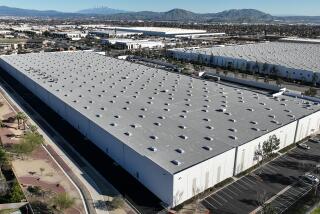Thousand Oaks Overrules Planners, OKs Amgen’s Expansion : Business: Biotechnology giant provides 13% of city’s jobs. Council endorses a development plan to make room for 6,300 new workers.
- Share via
Biotechnology giant Amgen Inc. is free to expand its world headquarters with minimal municipal meddling, as the Thousand Oaks City Council has approved the firm’s ambitious plan to build a high-tech corporate campus for thousands of new employees.
Reversing several Planning Commission decisions, the council on Tuesday endorsed Amgen’s proposal to make room for 6,300 new workers over the next quarter of a century by building offices, warehouses, manufacturing plants and research labs.
The 4-0 vote clears the way for Amgen to build swiftly on its 100-acre campus in the Rancho Conejo Industrial Park. The expansion will cost $785 million for construction alone, officials said.
The council’s vote late Tuesday allows Amgen to construct labs 75 feet high--the tallest private development in a city that has long prided itself on protecting mountain views.
In another unprecedented decision, the council exempted Amgen from the traditional permit process, allowing the Newbury Park firm to develop some buildings without holding public hearings.
Councilwoman Jaime Zukowski abstained from voting because her husband works for Amgen. But the other four council members lavished praise on Amgen for bringing so many high-paying, non-polluting jobs into the community.
They noted that other high-flying companies have left California, seeking better tax breaks or cheaper real estate. In contrast, they said, Amgen officials have always expressed a desire to remain in Thousand Oaks, where the biotechnology firm was founded in 1980.
“Amgen provides 13% of the jobs in our city now,” Mayor Elois Zeanah said. “They could have come to this council and held us hostage. But they didn’t. To Amgen, we want to say: ‘Thank you. You’re first-class and we’re lucky to have you here.’ ”
The council approved the concept of creating three building-height zones on Amgen’s 100-acre campus. Buildings on the fringe, closest to public streets and private residences, would adhere to the city’s general 35-foot height limit. But facilities tucked inside the complex could range to 55 feet, or even 75 feet in the interior.
In all three zones, a building’s height would be determined by averaging the height of each of its walls. Under this system, one wing of a building could exceed the stipulated height limit, as long as another wing came in under the cap.
The Planning Commission had sought to impose an absolute limit on building height and to forbid any one wall from poking above that cap. Amgen, however, denounced that formula as “unworkable,” and the council agreed.
Siding with Amgen on other controversial issues as well, the council voted to allow the company to obtain permits for its buildings in the 75-foot zone without going through the lengthy public hearing process.
Instead, the company will simply present its plans to the city’s planning department for an “over-the-counter” approval. Neither Amgen nor the council will have the right of appeal.
*
Finally, the council agreed to grant Amgen a “fudge factor” to allow flexibility in design. This rare provision allows Amgen to deviate, by 5%, from the development standards approved by the council.
The 5% variance applies to building height, setbacks from curbs, driveway width, number of parking spaces, size of signs and other aspects of the development. But Amgen executive Ed Bjurstrom promised not to use the fudge factor to increase building height in the 75-foot zone.
The council’s swift 4-0 vote in favor of Amgen came after a dozen public speakers had implored the city to treat the world’s largest biotechnology company as a vital community asset.
Noting that all 35 residents who signed up to speak and all 207 who submitted written statement cards indicated support for Amgen, Zeanah asked her colleagues whether they needed to hear more testimony.
To the cheers of the overflow crowd, including at least 100 Amgen employees, the council members all said they were ready to approve the biotechnology firm’s plan.
“It’s absolutely amazing that here we have a project that varies, in some respects from our building height and setback requirements, and there is not one person here in opposition,” said Councilman Alex Fiore.
In his nearly 30 years on the council, Fiore said, “it’s never happened before.” Jokingly comparing the unanimous support of Amgen’s tall buildings with the continuing dissension about the Civic Arts Plaza’s tower, Fiore added: “I think we put the Civic Arts Plaza in the wrong place.”
After the vote, dozens of residents swarmed around a broadly grinning Bjurstrom, Amgen’s director of engineering and construction. Like a well-connected host greeting guests in a reception line, Bjurstrom shook hand after hand and slapped back after back.
Insisting the unanimous verdict did not surprise him, Bjurstrom said simply: “I had high hopes.”
*
Throughout the 2 1/2-hour hearing, scores of Amgen employees camped out in the snack room adjacent to the packed council chambers. Squashed next to microwaves and coffee machines, swigging milk and downing chocolate bars, they applauded raucously as strangers lavished praise on their company.
With more than 2,000 employees, Amgen is the city’s largest employer, edging out General Telephone Co. and the Conejo Valley Unified School District. The biotechnology firm, which manufactures drugs to help kidney dialysis and chemotherapy patients, reported revenues last year of $1.4 billion.
More to Read
Sign up for Essential California
The most important California stories and recommendations in your inbox every morning.
You may occasionally receive promotional content from the Los Angeles Times.













